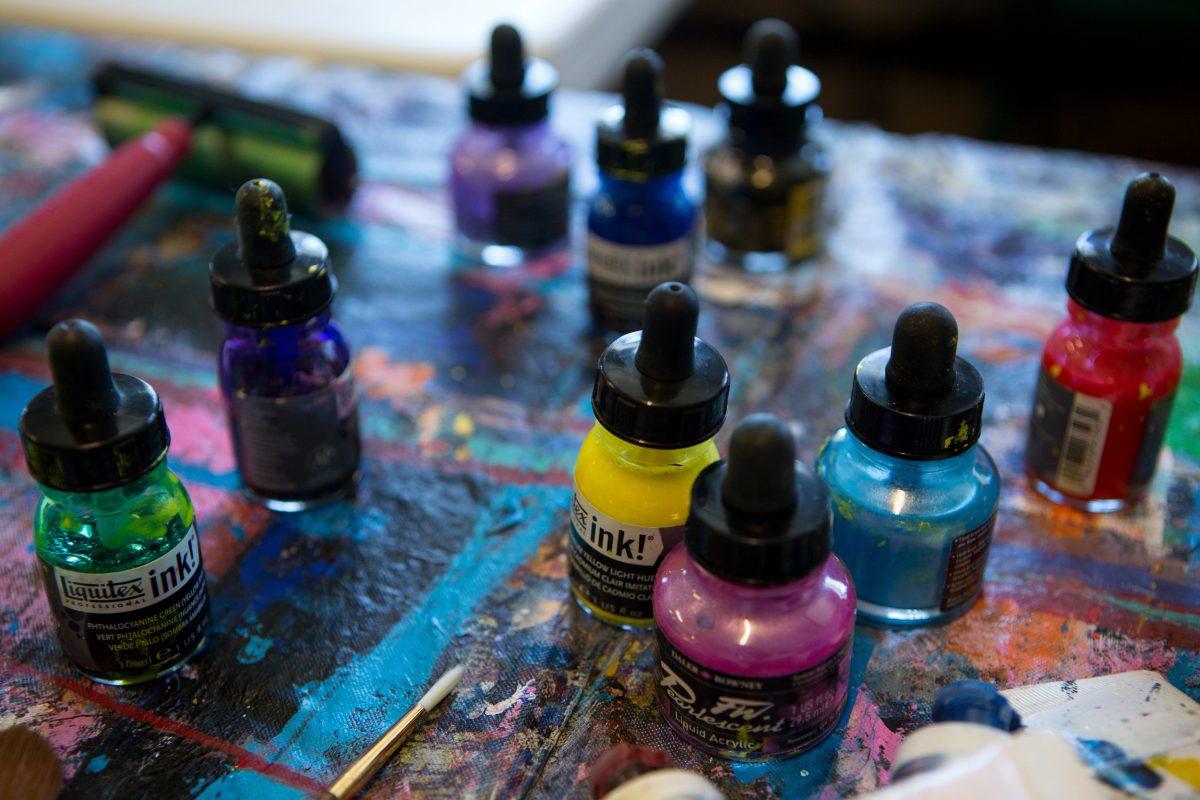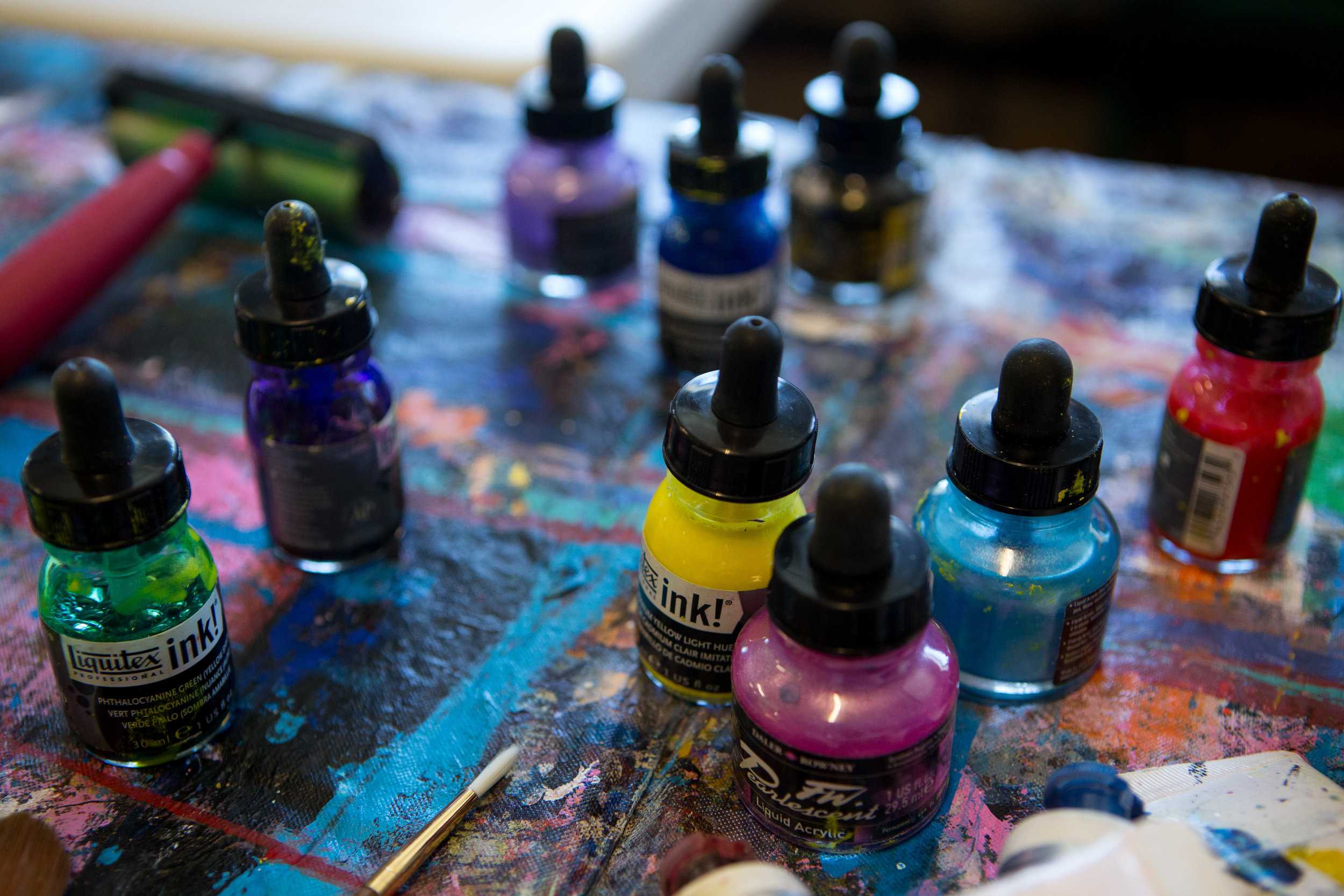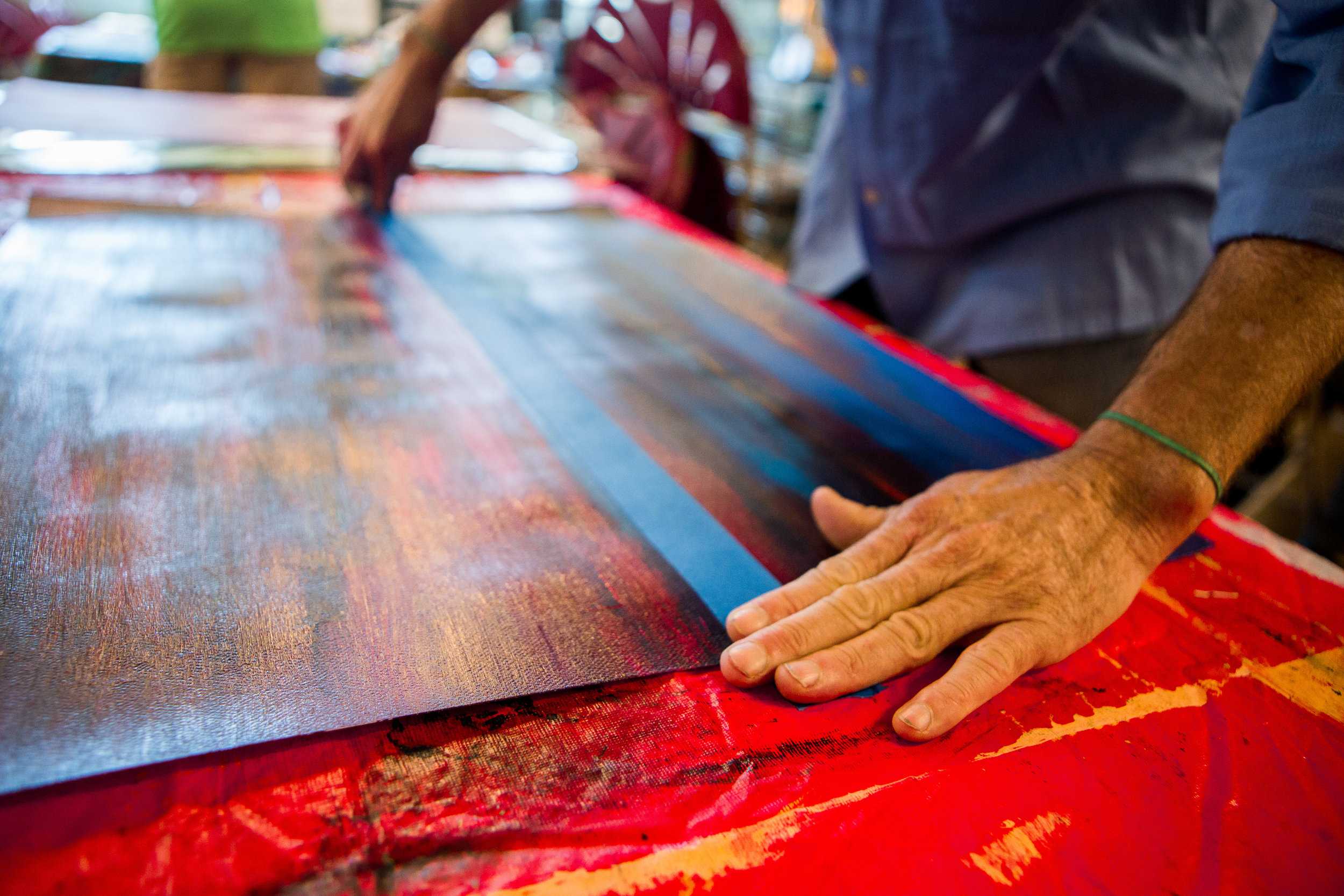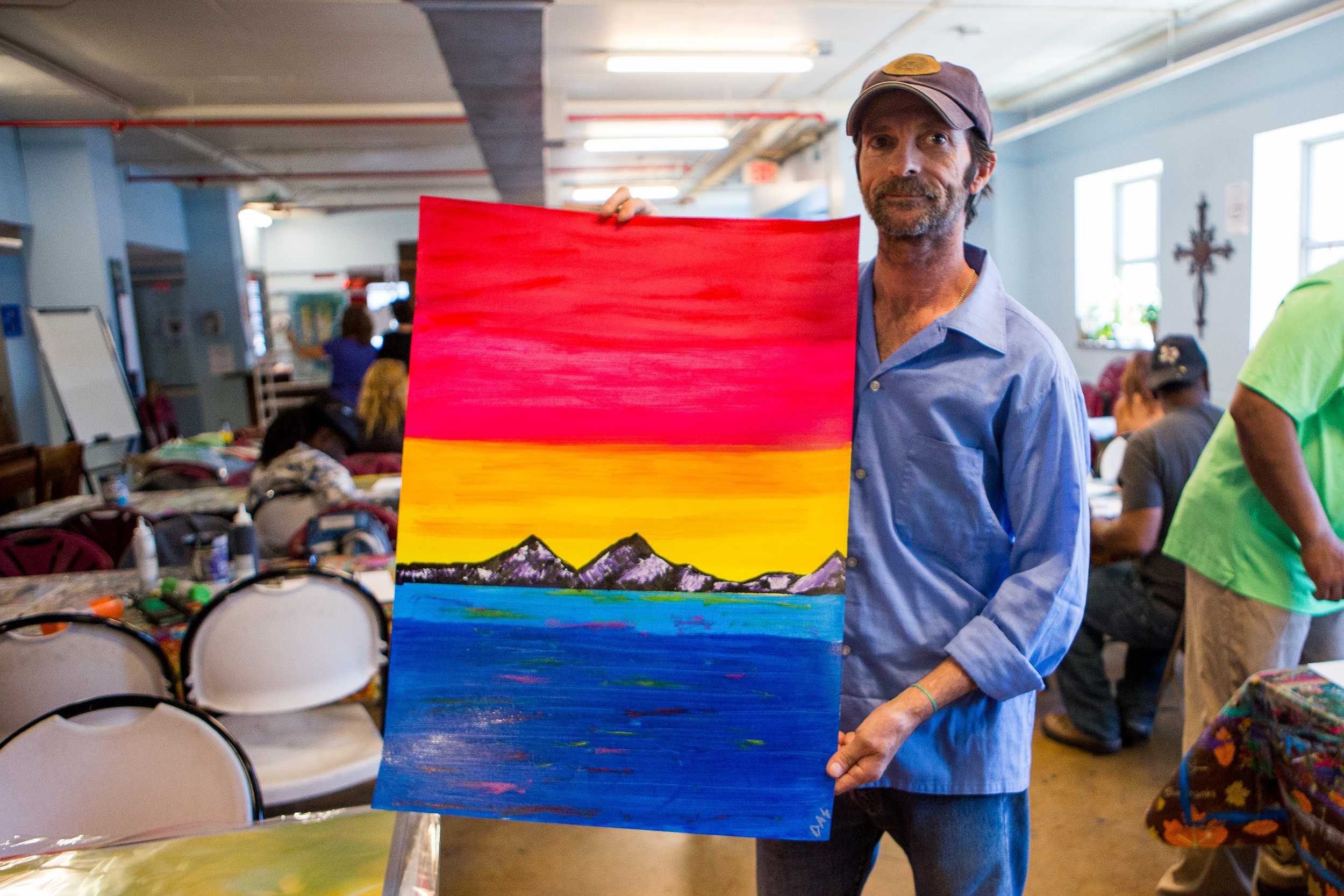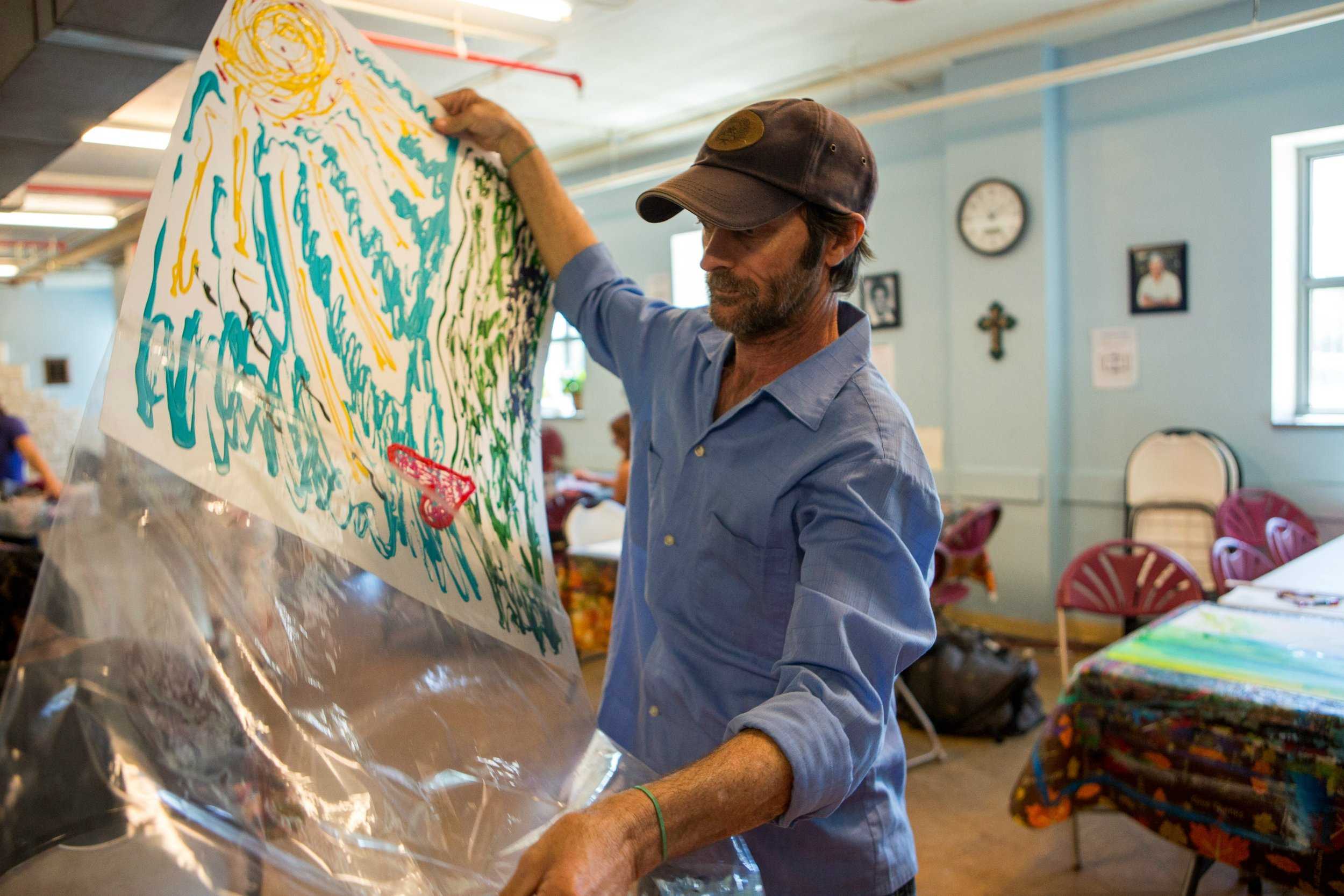Editor’s Note: This story originally appeared in Digital Issue V.
Art From the Streets, or AFTS, is a nonprofit organization that gives homeless artists a place to work and a way to sell their art.
Story by Kassidy Curry
Photos by Cori Baker
Various acryclic paints are laid out on the table in the AFTS studio.
In the early fall of 2014, David Schumaker was walking through downtown past St. David’s Episcopal church when he was stopped by Elizabeth Romanella. She was sitting on the steps outside of the Trinity Center and saw that Schumaker looked troubled. “I just started telling her about the grief I was going through with my parents passing,” Schumaker says. “I sat out there on the steps and told her my story, told her about my hurt and anger.” After talking, she invited him to come inside and paint with the program she was volunteering for, Art From the Streets.
Art From the Streets, or AFTS, is a nonprofit organization that gives homeless artists a place to work and a way to sell their art. AFTS was founded in 1991 by Heloise Gold and Beverly Bajema. The two were working to connect with the homeless community by passing out food, but then they decided to bring people some pen and pencils. After learning that many within this community were artists, they decided to create a space where homeless people could pursue their art.
Since then, AFTS has grown significantly. Four years ago, it became an official non-profit organization. The program originally held classes at the Austin Resource Center for the Homeless, but eight years ago it moved to the Trinity Center at St. David’s. Currently it operates by hosting classes three times a week. During class, artists come into the studio and work freely while volunteers facilitate.
Their work is sold throughout the year both online and at small shows, but the event that garners the most attention is the annual show hosted at the end of each year. The artists receive 95% of the proceeds from sales. “It’s a stepping stone,” executive director Kelley Worden says. “They’re not making a living, but it can be part of the process.”
Schumaker works diligently on one of his paintings.
Romanella has been volunteering for AFTS for over 10 years. She has a masters degree in art administration and has worked in various positions in the arts, her last job being in the architecture department at the University of Pennsylvania. She heard about AFTS from a local PBS program and thought that, given her background in art, it would be a good fit. “One of the joys for me is to see someone come in with no experience, and yet they are willing to try,” Romanella says. “They hang in there and find something that satisfies them, whether it’s making the art, being a part of the community or both, and they stick with it.”
Schumaker came into the program without any previous experience. Since he joined the program, he’s been a part of two annual shows. He says his work is about doing “a little bit of everything.” Since he became involved with the program, he’s started to see his life change for the better. “I was watching the people there and I saw them grow, and I realized I wanted that too,” Schumaker says.
Schumaker was born in Austin into a family of six children and grew up in the then-rural Cedar Park area. After high school, he served in the Navy. When he came home, he rekindled a romance with his old high school sweetheart, who was at that point divorced with two kids. They went on to have a child together, but Schumaker never looked at the kids from her previous marriage as step-children and says that he considers them his own kids. Even though he and his wife are now split up, he still sees it that way.
Schumaker’s parents died in 2013. He spent the last five years before their passing taking care of them in their own home. “We made them promises a long time ago that they would never go to a nursing home,” Schumaker says.
After losing his parents, Schumaker says he became lost. He found himself going to a dark place and returning to old habits of addiction. He had no place to stay and was living out of his car.
Schumaker showcases his landscape painting of mountains, the ocean and a sunset.
After about a year, things started to look up for Schumaker. Around the same time he joined AFTS, he got a job in food prep at Cypress Bend Cafe at UT. At this time, he also began the process of finding a place to live.
To find housing, Schumaker worked with different social workers through the Veteran’s Administration. After staying for three months in a transitional house called Safe Haven, he found permanent housing in a one-bedroom apartment. “It’s a single person apartment, but I prefer to call it a cubicle,” Schumaker says, joking. “But it has everything a person would need.”
As things started to get better for Schumaker, he decided he no longer needed to ask for money. He used to hold his sign on a corner in North Austin with a piece of cardboard that read “25 cents God Bless.” Initially, Schumaker was hesitant about asking for money, but once he got out there, he says he met a lot of generous people and even some people who came by on a regular basis to help him out. One man who worked at a nearby AutoZone once gave him his own pair of shoes after seeing him stand on the corner in worn out shoes held together by duct tape.
After deciding he didn’t need to ask for money anymore, Schumaker went back one last time to his corner in North Austin just to give thanks. “They started to hand me money, but I told them that ‘I just came to tell y’all thanks for the times that you helped me,’” Schumaker says.
Schumaker recently left his job at Cypress Bend Cafe after working there for over a year. He decided that he was ready to take time off and have what he calls “me time.” He currently volunteers his Friday mornings at the Trinity Center by helping prepare breakfast for the Austin homeless community. He says that giving back to his own community and helping people he knows has filled a void.
Schumaker pulls out one of his paintings from its protective wrapping.
Schumaker continues to work with AFTS. The program is nothing if not a strong community. Though it revolves around the artists and their work, the most valuable aspect is the kinship and support that the program provides to all who are involved. “It’s like they’re family,” Schumaker says.
Through the help of this community over the past few years, Schumaker has seen his life change for the better, like he had seen in other people in the community before him. “My biggest takeaway is knowing that I’m on a journey, and it doesn’t have to be a negative journey,” Schumaker says.































